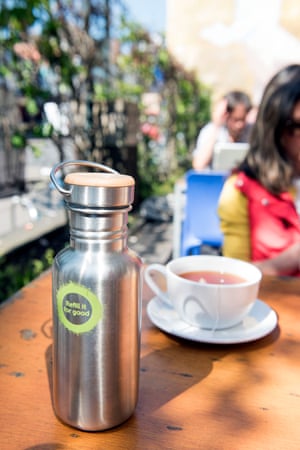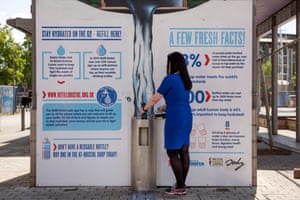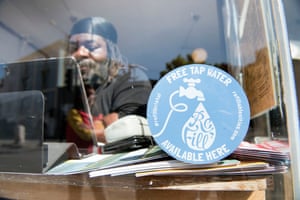Source: theguardian.com
Published: June 29, 2017
Natalie Fee left a job in television to focus on reducing plastic pollution. Her latest project, Refill, aims to make reusing a plastic bottle simpler than buying a new one and it’s catching on in cities from Bath to Bonn

Natalie Fee, the driving force behind Refill, which persuades businesses to let consumers refill water bottles and customers to reuse. Photograph: Adrian Sherratt/The Guardian
Scrambling down the muddy riverbank, Natalie Fee frowns as she looks out across the River Avon. Three weeks earlier she had spent a day with other volunteers collecting hundreds of plastic bottles that were littering the river as it made its way to the sea. Now a new tide of plastic has returned.
“In a sense it is dispiriting,” says Fee as she starts to gather up the bottles strewn along the bank. “In another way, it just highlights how important it is we keep pushing ahead with the work we are doing.
Fee, 38, is the driving force behind a campaign which aims to cut the millions of plastic bottles that end up in the world’s oceans each year. The Refill campaign persuades businesses to sign up to a scheme allowing people to refill their water bottles on their premises rather than throw them away.
Fee launched the project in 2015 and a couple of months later 200 businesses in Bristol had signed up. Now towns and cities across the UK and Europe are joining.
“All we are doing is linking people who want water with businesses and organisations who have taps and are happy for them to be used, but it has really taken off,” Fee said.

Refill encourages consumers to reuse rather than recycle or throw away. Photograph: Adrian Sherratt for the Guardian
A Refill app shows which businesses nearby are happy to fill water bottles. The app offers reward points when people fill up their bottle, which can be redeemed to earn a stainless steel water bottle. The longer-term ambition is that users will be able to translate points into vouchers for ethically produced clothes and equipment – and even be informed about traders who avoid plastic waste.
As well as about 200 cafes, businesses, pubs and shops in Bristol, the movement has spread to Dorset, Devon and Bath. Norwich and Brighton are close to launching, and Hull, Leeds and Manchester are among other UK cities that have expressed an interest.
After Bristol was named European Green Capital in 2015, the Refill campaign was promoted as a “legacy project” and now sister schemes have launched in Hamburg, Bonn and other German cities.
“Every time someone refills a bottle rather than throws a plastic one away, we are reducing the amount of plastic that reaches the ocean,” Fee said.

A water bottle refilling station in Millennium Square, Bristol. Photograph: Adrian Sherratt/The Guardian
Further afield, there is a similar acknowledgment that something has to be done to reduce the startling growth in use of plastic bottles. Almost half a trillion (500,000,000,000) will be used in 2017 alone.
In Australia, the drive to stop bottles being thrown out after a single use has manifested in a growing number of water fountains in public spaces that encourage people to refill their bottles.
Many councils, shopping malls, universities and other public space operators have contracted companies to install the water fountains with visible and convenient attachments made to refill bottles in areas of high pedestrian traffic, and some have produced websites and apps, showing people where they can find the fountains.
The UK campaign calculates that if every Refill station in Bristol performed just one refill everyday, 73,000 fewer plastic bottles would be thrown away every year in Bristol alone. If every Bristolian refilled once a week instead of buying a single-use plastic bottle, the city would reduce its waste plastic bottle consumption by 22.3m a year.
Fee, who worked in television before launching the campaign, was inspired to abandon her media career after seeing a video about the damage plastic was doing to albatross chicks.
She launched the City to Sea campaign group in 2015 – which has already persuaded the major supermarkets to stop using plastic in their cotton buds – and now Fee has turned her attention to plastic bottles.
In Bristol’s Canteen cafe, Gus Hoyt, the campaign’s programme manager, explains how the project now has the backing of several regional water companies and has just secured a grant from the outdoor clothing company Patagonia.
“We want to see this scheme everywhere within the next three years,” Hoyt said. “It’s about local groups deciding they want to get involved and setting something up in their area on a grassroots level. We’ve got more people getting in touch every day.”

A Refill campaign sticker in the window of Cafe Kino in Stokes Croft, Bristol. Photograph: Adrian Sherratt/The Guardia
Hoyt said a few residents from Hunstanton on the Norfolk coast got in touch recently after a sperm whale was stranded on a local beach.
“It turned out the whale had huge amounts of plastic in its stomach and the local people wanted to do something about it so they got in touch and now there is a Refill Hunstanton project ready to launch this summer. People are doing it for themselves.”
Back on the banks of the Avon, Fee has gathered a small mound of plastic bottles from the riverbank in a few minutes.
“We’ve still got a long way to go to get people in the habit of refilling and refusing single-use. But it feels like things are changing, that there is an appetite to do things differently.”
Michael Slezak contributed reporting to this article from Sydney
